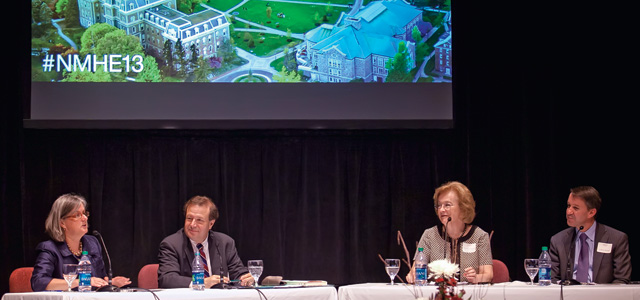A Roundtable: Challenging Times for Higher Education

Lafayette Provost Wendy Hill (left) moderated a discussion on “New Models for Higher Education” featuring Steven Poskanzer, president of Carleton College; Elizabeth Boylan, director of STEM education programs at the Alfred P. Sloan Foundation; and Jeff Selingo, author of College (Un)bound: The Future of Higher Education and What it Means for Students.
“Justifications of why to go to college fall into three broad categories, and each of these desirable outcomes is enhanced by the residential college experience,” said Steven Poskanzer, president of Carleton College, in a lively and provocative Inauguration Day roundtable on challenges and opportunities facing higher education. The outcomes include acquiring essential practical skills, preparing for citizenship, and becoming equipped to live a life of “meaning, purpose, and fulfillment.”
“The future [will be] more unbound from the bound system today—one that moves from one-size-fits-all to more of an a la carte menu where students and families can pick from an educational buffet.”
—JEFF SELINGO
But residential colleges must acknowledge that there may be merit to emerging challenges to the idea that spending four years in their setting is “sacrosanct.” Noting that baccalaureate degrees are earned in three years in sophisticated higher-education systems outside the United States, he said, “If four years are essential” at colleges like Carleton and Lafayette, they must “do a much better job of demonstrating with hard evidence the marginal value of additional time spent in such learning communities.”
“The challenge is going to be doing qualitative assessments that give us a sense of the extent and depth of impact… assessment for accountability but also for effectiveness.”
—ELIZABETH BOYLAN
Joining Poskanzer on the panel were Elizabeth Boylan, director of STEM education programs for the Alfred P. Sloan Foundation, and Jeff Selingo, editor-at-large at The Chronicle of Higher Education. Lafayette Provost Wendy Hill served as moderator.
Poskanzer’s remarks foreshadowed thoughts President Alison Byerly expressed in her inaugural address later that afternoon. In challenging times for higher education, she said, including an “explosion of popular interest” in massive open online courses (MOOCs), Lafayette must be able to justify the value of the “complete package” of elements—the academic program, athletic and extracurricular opportunities, and residential environment—that make up the Lafayette experience.
The changing landscape of higher education is of special interest to Byerly, a nationally known commentator on emerging forms of digital scholarship, the changing role of the humanities in the digital age, the importance of curricular innovation, and MOOCs.